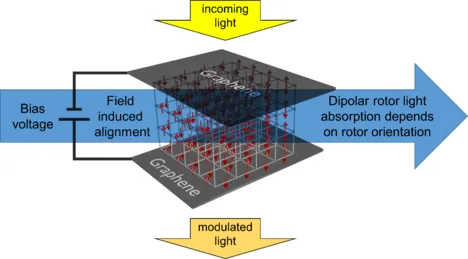Dipolar rotor MOFs constructed from linkers with high dipole moments: temperature dependent photoluminescence and dielectric spectroscopy
Dipolar rotor • Photoluminescence spectroscopy • Dielectric spectroscopy
S. Hamer,(a) J. Fischer,(b) C. Li,(d) X. Zhang,(c) A. Beyer,(c) L. Heinke,(d) R. Herges,(a) I.A. Howard (b)
(a) Otto-Diels-Institut für Organische Chemie, Kiel University, Otto-Hahn-Platz 4, D-24118 Kiel, Germany
(b) Institute of Microstructure Technology, Karlsruhe Institute of Technology, Hermann-von-Helmholtz-Platz 1, 76344 Eggenstein-Leopoldshafen, Germany
(c) Fakultät für Physik, Universität Bielefeld,Universitätsstr. 25, D-33615 Bielefeld, Germany
(d) Institute of Functional Interfaces, Karlsruhe Institute of Technology, Hermann-von-Helmholtz-Platz 1, 76344 Eggenstein-Leopoldshafen, Germany
Metal organic frameworks (MOFs) offer a unique ability to create a 3D solid in which dipolar rotors can be incorporated at a sufficient density that dipole-dipole interactions between neighbouring rotors are strong, but sufficient free-volume is maintained that the rotational motion of the molecules is not sterically hindered. In the present contribution we investigate a UiO analogue MOF with an octahedral structure based on Zr nodes and dipolar rotor linkers with dipole moments on the order of 10 Debye. In order to analyse the rotational dynamics we study the photoluminescence of the MOF as a function of temperature, as well as performing dielectric spectroscopy.
These initial results suggest that: 1) MOFs incorporating linkers with high static dipoles can be grown utilizing solvothermal methods with highly polar solvents, 2) the luminescence of the linkers in the analogue UiO structure can be preserved, but significant bathochromic shifts are observed from the photoluminescence of the linker in solution, and 3) the bathochromic shift and the behaviour of the photoluminescence as a function of temperature are different in the dipolar rotor MOF than the linker in its polycrystalline powder form, suggesting effects of rotational dynamics may be observable in the MOF system.
Interested in finding out more? Click here to learn more about this overarching COORNETs Phase II team and project.
